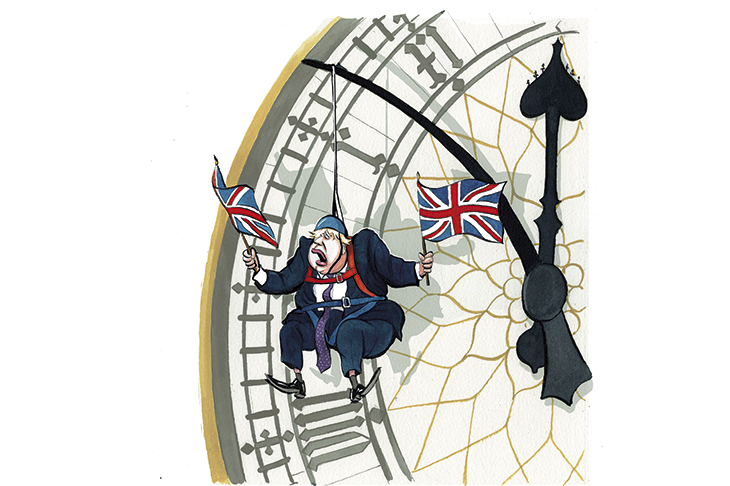I think that Thomas Babington Macaulay had the last word about Boris Johnson’s forced resignation as prime minister of the UK: “We know no spectacle so ridiculous,” Macaulay wrote, “as the British public in one of its periodical fits of morality.”
Macaulay’s line needs to be slightly adjusted, it is true, because, ridiculous though public displays of puritanical moralism are, in this case it was mostly Boris’s colleagues in Parliament, not the public at large, that suffered that unbecoming fit of morality. Indeed, throughout it all, Boris — a politician with more élan than any prime minister since Margaret Thatcher — remained popular with the public. He was especially popular, I think, with the American public.
And why not? In the sea of squishy gray on gray that is the political establishment, Boris stood out as a vibrant, technicolor force of nature. He was probably better educated and more amusing than any PM since Churchill. It somehow seems appropriate that Macaulay made his famous comment in the context of a review of a book about Lord Byron. The scolds didn’t like Byron either.
On most of the big issues, I was at one with Boris. The biggest of the big issues, in my view, was Brexit. I do not think that partial recovery of British sovereignty would have happened absent his support. As the Tories huddle to discover a character sufficiently lackluster and housebroken to replace Boris, the greatest danger will be capitulating to the many Remainers who populate the party and would like nothing better than to return Britain to the jurisdiction of Brussels and rule by a Davos-inspired unaccountable elite. I’d like to see someone like Dan Hannan, Jacob Rees-Mogg, or (speaking of colorful characters) Nigel Farage replace Boris, but I suspect that the Humphrey Applebys of the world will step in and assure that the job goes to someone joyless as well as mediocre.
Speaking of Nigel Farage, that ardent Brexiteer told Fox News that Boris was elected as a conservative but governed as a liberal. Alas, that is largely true. Boris’s craven subservience to the “Green agenda” of the climate change fanatics and eco-nuts betrayed the country and help sow economic chaos. Deep down, I suspect, Boris must have known that (in the words of the commentator Robert Bryce) what the world needs now is cheap, abundant energy, period, full stop, end of discussion. In short, fossil fuels are mankind’s friend. The unpleasant irony is that their exploitation has made the world so rich that we have to put up with busybodies skirling about the dangers of climate change as they jet hither and yon to enjoy the fruits of a fossil-fuel-supported economy.
People say Boris lost the confidence of his cabinet and of his party generally. Maybe. I think he was the victim of peculiarly unattractive form of moralistic puritanism. As he observed at the end of his resignation speech, “When the herd instinct moves, it moves.” Much was made of some parties he had in 10 Downing Street during the Covid lockdown. Wasn’t that hypocrisy? Possibly. Or perhaps it is just an illustration of the old maxim that Quod licet Jovi, non licet bovi. At the end of the day, who cares? He handled Covid better than any leader in Europe, and I for one did not begrudge him that notorious piece of cake.
It seems that the straw that broke the back of Boris’s premiership was the behavior of a (now former) deputy chief whip who glories in the name “Pincher.” Apparently, Boris was right when he commented “Pincher by name, Pincher by nature,” for the hapless chap drank too much and proceeded to grope a couple of men at the Carlton Club. The press describes them as “victims,” though in a more straightforward time they would have responded to such unwelcome advances by pasting Pincher in the kisser, thus transforming themselves from victims to victors. Autres temps, autres mœurs. Now the poor dears whine and preen for the papers.
In his resignation speech this morning, Boris said that in politics no one is irreplaceable. I am not sure that is true. Would Churchill have been replaceable in 1943, or Margaret Thatcher in 1980? Someone else would have been found to assume the post of prime minister, but that is not quite the same thing.
Boris made a lot of mistakes. But anyone who can recite a passel of Homer, in Greek, at the drop of a hat and from memory with splendid enunciation, will be hard to replace.
“Oh,” you object, “but memorizing ancient Greek is no part of a prime minister’s qualifications.” Are you sure?
As I say, there is a lot to criticize about Boris’s performance. But he got a few big things right and his entertainment value was unparalleled. Boris’s hour strutting and fretting upon the stage reminds me of something Santayana says about the Englishman in Soliloquies in England. “It will be a black day for the human race when scientific blackguards, conspirators, churls, and fanatics manage to supplant him.” Noted.


















